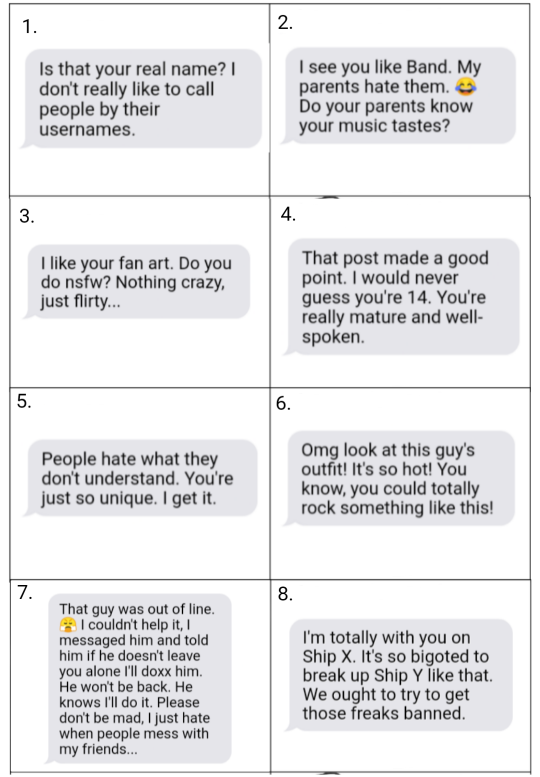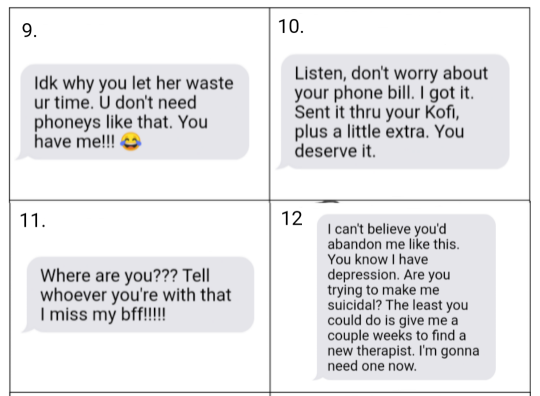#without even touching on how unrealistic and oppressive it is to ban pretty much anything thats used in grooming
Explore tagged Tumblr posts
Text
Grooming is when someone builds a relationship, trust and emotional connection with a child or young person so they can manipulate, exploit and abuse them.
Grooming Can Look Like:


1. "Is that your real name? I don't really like to call people by their usernames."
Asking for personal information right away - It gives a false sense of intimacy and can be used later to threaten or blackmail.
2. "I see you like Band. My parents hate them. 😂 Do your parents know your music tastes?"
Segueing quickly into private life, sometimes asking invasive questions about home, friends, family, etc - It tells them whether or not a person is isolated, unhappy, self-destructive, unsupervised, etc. The more vulnerable a person is, the more successful grooming can be.
3. "I like your fan art. Do you do nsfw? Nothing crazy, just flirty..."
Bringing up sexuality or other adult subjects in a general way - It pushes the person's boundaries gently, getting them to talk about nsfw things in a way that feels nonthreatening.
4. "That post made a good point. I would never guess you're 14. You're really mature and well-spoken."
Describing the person as mature, smart, wise, resourceful, street-smart, etc - It's flattering, and it gives the illusion of equality and respect in their interactions.
5. "People hate what they don't understand. You're just so unique. I get it."
Reinforcing that the person is unique, misunderstood, above others, etc - It increases isolation and forms a sense of dependance on the groomer.
6. "Omg look at this guy's outfit! It's so hot! You know, you could totally rock something like this!"
Sexualizing the person in flattering ways - It feels like a compliment and edges farther past typical boundaries, normalizing more and more sexual interactions.
7. "That guy was out of line. 😤 I couldn't help it, I messaged him and told him if he doesn't leave you alone I'll doxx him. He won't be back. He knows I'll do it. Please don't be mad, I just hate when people mess with my friends... "
Defending the person, often inappropriately - It's a show of devotion to the person, a display of the potential for aggression that serves to nudge boundaries, and can be used to threaten or coerce later.
8. "I'm totally with you on Ship X. It's so bigoted to break up Ship Y like that. We ought to try to get those freaks banned."
Creating an other to unify against, often inappropriately - It creates a sense of intimacy and serves as a way to push boundaries by encouraging inappropriate behavior.
9. "Idk why you let her waste ur time. U don't need phoneys like that. You have me!!! 😂"
Discouraging competing relationships - It increases isolation, vulnerability and dependence.
10. "Listen, don't worry about your phone bill. I got it. Sent it thru your Kofi, plus a little extra. You deserve it."
Giving gifts, money, or paying bills - It creates a sense of intimacy, and possibly financial dependence. And it can be used as a source of guilt.
11. "Where are you??? Tell whoever you're with that I miss my bff!!!!!"
Checking in, keeping tabs, tracking or asking for updates - It diverts the person's attention onto the groomer, interrupts their social life to further isolate, and creates a pattern of guilt and responsibility for the groomer's feelings.
12. "I can't believe you'd abandon me like this. You know I have depression. Are you trying to make me suicidal? The least you could do is give me a couple weeks to find a new therapist. I'm gonna need one now."
Threatening to harm themselves, or implying that they might if contact ends - It plays on that sense of guilt and responsibility and can be used long after abuse has happened, to prevent disclosure.
Grooming doesn't happen by accident. By definition, it's deliberate. When someone begins grooming, they have already decided to abuse. From that point on, interaction has one goal. It creates a situation where the person being targeted has conflicting emotions about what's happening, no one they trust to give advice, and no way to break out without being the bad guy.
The setup - the grooming behaviors themselves - vary. One abuser might use many approaches, and might even change methods if a target isn't receptive. I think we can all agree that guilt-tripping and displays of aggression aren't healthy under any circumstances, but many common behaviors are things that can happen outside of grooming, in other contexts, and be ok. (An old friend might give generous gifts purely out of friendship, but someone who's practically a stranger, giving generous gifts, acting like an old friend, is potentially predatory.) That's why it can be so hard to see. We can't simply ban their tools or latch onto keywords. There are no elements that are always present. There's no set pattern. There are few flags that are always red. It's not that simple.
The only reliable and realistic way to keep vulnerable ppl safe is to teach them to recognize potential grooming by looking at the entirety of the situation, to trust their feelings, and to speak up.
#im js#grooming mention#how to fix the worlds problems with a tumblr post#i cannot understand grooming survivors calling for bans and crackdowns#when it so obviously does not matter what is available to a groomer - they arent gonna just shrug and pack up and go home#theyre gonna switch tactics and then were back where we are now#except with a false sense of security#thats very very bad#without even touching on how unrealistic and oppressive it is to ban pretty much anything thats used in grooming#ffs i could argue that the most impactful thing a groomer can give is attention/encouragement#now are we gonna ban that or are we gonna teach kids to recognize when its manipulative and not genuine#be real here
26K notes
·
View notes